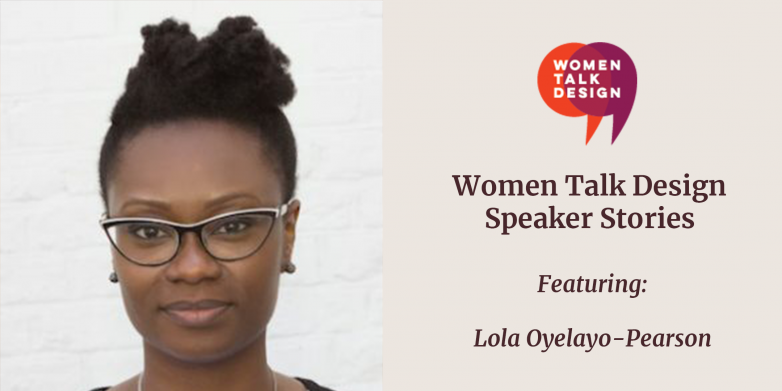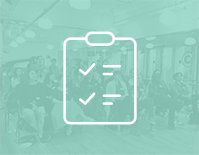Lola Oyelayo-Pearson on why you have to start with your opinion
As part of our #WTDSpeakerStories, we spoke with Lola Oyelayo-Pearson about her journey as a public speaker and why she believes that knowing your opinion on a topic is key and that some of the best talks she’s been to come from speakers who are still learning their subject.
In our Women Talk Design Speaker Stories series, we’re interviewing a Women Talk Design speaker every week about their journeys and experiences. We talk to speakers who are just getting started, speakers who have had their fair share of speaking mishaps, speakers writing books, and speakers curating events. At the end, we offer an opportunity for folks from the WTD community to ask their own questions and connect with each other. Visit our events page for more information about the series and RSVP for our next event.

Lola Oyelayo-Pearson is digital design and product strategist, with a wealth of experience running in-house and agency design teams. She currently leads a multidisciplinary User Experience team at Shopify in Toronto, helping merchants leverage custom financial products and exploit multichannel sales opportunities. Prior to that her experience includes leading the UK Design team for Capital One, heading up proposition design for a highly regarded blockchain start-up, and leading a successful products and services agency Cognizant. A passionate technophile, Lola operates at a strategic level, helping organisations to see the bigger picture and focus on the outcomes that matter in order to establish high-performing design cultures.
On why she speaks and how she got started
When talking about her origins as a speaker, Lola related her need to speak with her opinionated nature and the value she places on discourse.
“Anyone who knows me will tell you [that] I’m somebody who has opinions on everything. That doesn’t always mean valid opinions but if you give me a chance to have an opinion on something, I’m going to give you a point of view. I enjoy sharing, I enjoy debate, I enjoy conversations, I enjoy challenging myself. Public speaking is just another way for me to put my opinions out in the world and invite feedback, invite conversation, and be a part of the discourse.”
“As much as possible I try [to] do my public speaking around things that I know about rather than just have opinions on. But, to be honest, if you catch me on any given day I’ll probably give you opinions on something I have no business having an opinion on. It’s just in my nature to be opinionated.”
Lola talked about her first speaking engagement and how that experience on stage was scary but validating.
“The first time I did a presentation in front of an audience was in a work context. Through my graduate program when I was maybe 23, 24, I was pitching a program that I was developing with my team so I presented [it] to the executives. There was a conference for the execs and there were 50 of the most senior people in the company [there] and then I was this grad that came in and spoke. It was equal parts scary but also really validating. I knew I was talking about [and] I enjoyed being on stage.”
“I have a very high threshold for shame so I don’t embarrass easily. Being on stage didn’t embarrass me, I didn’t feel like I needed to be perfect – I stumbled [on] my words and I was kind of okay with that but that’s always been a part of my personality. I was able to really enjoy it and from then I took every other opportunity.”
Once she started speaking, Lola moved on to organizing events. She talked about how that enriched her speaking.
“Then I started organizing events, and that gave me the opportunity to both see and watch and learn from other speakers and find speakers and build programs. I got really into the idea of having an opinion again and creating spaces where conversations happen.”
On how she decides where to speak
Like most speakers we’ve heard from, Lola says she began by taking every opportunity she could find. But as her speaking experience grew and her personal life changed, she also evolved the way she approaches speaking engagements.
“A couple of things [have] changed. I became a parent so time became more precious. I [have] to pick what I said yes to because everything I say yes to is basically me expecting my husband to do the primary caring so we have to coordinate that. And, I have more responsibility at work so my calendar is just more of a nightmare so I’m more discerning about the event types.”
“I had a really great coaching session from a mentor of mine in the UK about five years ago. I was reflecting on [how] I feel like I say no too often and I feel really bad because I love the event or people come up with a great idea [and] I’d really love to speak there. And he was like, “You know what? Just start charging for your time.” And what I find now is [that] requiring payment is a great filter for things. If I’m being paid, I will be able to prioritize [and event and] if I’m not being paid, I need to decide if I actually want to spend my time that way.”
Lola also talked about the context around her invitation to speak and the nature of the event itself factor into her decision process.
“I refuse to be a token. I’ve been approached a lot where it’s clear that I was the last minute, ‘Whoops, we don’t have a person of color!’ type addition. I don’t think I need to help you with that. I don’t need to hustle my life in order to be the last minute person of color badge [at] your event.”
“I also try not to speak at events where I don’t know who my audience is. There are giant conference companies around the world that do big business deals and they’ve got 2000 sponsors and they’ve got 72 stages and topics and 25 tracks. I’ve never been to one of those and felt like I got all the value that I would have wanted from the event. It always felt a little bit advertising-y. So I don’t speak at those kinds of things. I don’t know who you’re trying to speak to at this conference and so I don’t know that my people would be there and therefore it’s very hard for me to craft an opinion or share a topic and so I’m going to step away from that.”
On how she develops talks
Lola went over her process for developing a talk and how that has changed over time to allow her more flexibility.
“Initially what I used to do is I’d have a point of view and then I would go straight into creating a deck – put everything, ignor[ing] quality, and then go through and start pulling stuff out and start shaping a beginning, a middle and an end. That was okay in the days when my talks were almost like case studies – we did a thing, here’s what we did, here’s what happened, here’s what I learned. As I’ve evolved a lot of my talks to be triggers for thought or mental models or even ways of cultivating a discussion, I’ve had to evolve it.”
“Now start with almost a blog post. I write what I’m thinking and articulate my perspective in long form and then I take that long form version and I deconstruct it into decks. I find it easier to edit myself from written content into slides than to create slides and then pull the slides out. I always feel like I’m invested in the slides [and] I struggle to make it shorter. If I never created the slides in the first place, it’s much easier to go that way.”
“It also makes it easier when I have different time slots. I repeat my talk sometimes and occasionally you’ll [have] a 45 minute slot so you can speak for 35 minutes and then there’s questions and sometimes you’ve got 25 minutes all in. I find it easier to create long and short versions of a talk. Once I’ve done the long form exercise, I can edit the presentation down, as opposed to the whole thing only work[ing] if I do the slides in this particular way.”
Lola emphasized that in addition to subject matter experts, speakers who are still learning have a lot to offer with their talks
“It’s also more challenging. I have a little bit more imposter syndrome in this new world of conversation. I feel like I’m talking about harder subjects, harder concepts. There are always a million people who are more qualified than me to speak on something. And so I go through a process of really saying, ‘What is my voice? What is the thing that I’m trying to say through this?’ And sometimes that might be as a learner.”
“I feel like some of the best talks I’ve listened to [were] not from the expert in the thing. They’re from somebody who’s on a learning journey and so they have been able to apply a perspective that maybe the experts themselves don’t have. It’s almost like that idea of knowledge I’ve already got so I’m operating at [a] level above the basics where somebody on a learning journey is still working through some foundations. As a learner at conferences, I often find myself enjoying the talks where people are sharing their journey more than saying, ‘I’m already here, now I’m going to tell you what you need to think about this subject.’”
On how public speaking has affected her career
Lola credited public speaking for boosting her career through increased visibility and an expanded network.
“I see the positives and the negatives of this equally but I recognize that people want to validate when they’re hiring leaders in tech. And there’s that sense that pre-validation is hard to find if you don’t exist on the web. I have my own site. I post links to the videos of all of my talks on there and I link it through to my LinkedIn profile and I’ve had feedback that it’s one of the things that made me [visibile]. In my current role, I was found. I did not apply. And so it has generated work opportunities for me. It’s also allowed me to be invited to forums that I’m not even sure I would have been invited to because I just exist as a black female in this tech space.”
“The other thing that it’s done for me is just [add to] the richness in my network. Every time I do a speaking event, I connect with a ton of people, whether it’s in person or virtually. There’s a growth of my network and interesting conversations that I almost always have afterwards. I really enjoy that part of it as well because if you play the algorithms game of Twitter or LinkedIn, for every new person that you connect to you can get a door opening to their network and suddenly you get this richness of suggestions and things like that.”
On her advice for new speakers
Lola shared her most crucial piece of advice for new speakers: know what you think.
“Make sure you know what you think. I think public speaking feels a bit like a rite of passage [or] a thing you need to say you have done. And sometimes I think people do it for the sake of doing it as opposed to recognizing, ‘Hey I’m allowed to have an opinion and to share my opinion.’ When I’m walking through talks with people or they’re saying they want to speak about something I’m like, ‘Okay, work on making sure you really get what you think. Formulate your opinion, know where your boundaries are, know how you think about it.’ Everything else is just learning, everything else is practice. The forming an opinion part is where you need to start every single time.”
Lola also gave some advice on creating engaging proposals by treating them with the same storytelling care you would a talk.
“Most conferences that [are] open for calls will tell you a theme: here’s an area that we’re interested in receiving talks from. I said earlier on, I’m a big believer in storytelling – here’s the beginning, here’s the middle, here’s the end, here’s the protagonist, here’s the drama. In a conference proposal, I apply that same logic. What I have always found worked for me on the conferences I’ve submitted to is, I don’t have to have it worked out when I submit the proposal, I simply need to have a really great story pitch in mind.”
“[Tell] a great story and really dial up how you can bring some of that theater and drama to the conference. Because that’s what the curators are looking for. They’re trying to put together a program of talks that are interesting [and] different that people are going to be like, ‘Whoa that was so cool.’ They want to generate buzz on Twitter so you want to be able to present yourself as somebody who can bring that level of storytelling and energy to their conference and so your pitch has to almost have that crafted story element to it.”
For more on what she’s currently speaking about, what she’s looking forward to, and her thoughts on getting paid to speak, check out the full video below.

